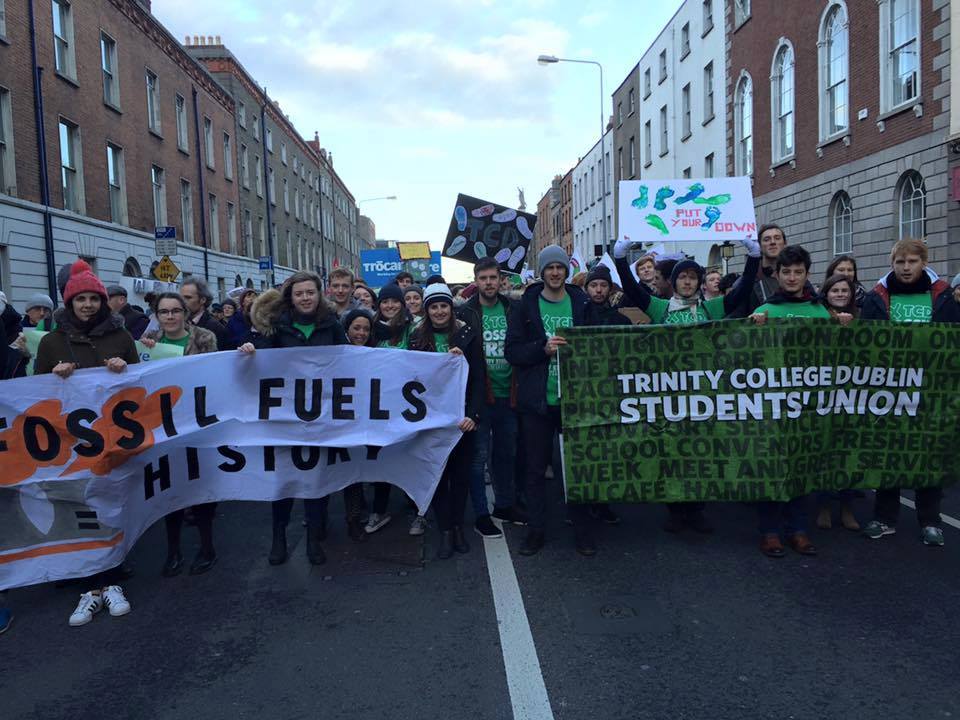
Speaking to Trinity News, Áine O’Gorman, a committee member of Fossil Free TCD, said of Divestment Week: “[It] is to raise awareness of the campaign, connect with other campaigns and facilitate a discussion.”
Kicking off the week was a panel discussion on divestment, the tactics used by its supporters, and its history. The event saw special guests such as Deirdre Lane, co-founder of People’s Climate Ireland, offer their insights into divestment.
The SU was not without representation, with SU president, Lynn Ruane, sitting on the discussion panel, and Karen McCord, SU environmental officer, in attendance.
Praising the campaign, McCord said: “There’s an amazing group of passionate students behind the campaign.” Students are invited to “[join] the campaign and [contribute] whatever time they can to help us make Trinity divest from fossil fuels.”
The first speaker was Poul Holm, a lecturer in human geography in Trinity. He drew parallels between the anti-tobacco movement and the fossil fuel divestment campaign. The “immediate cover up by the tobacco industry” of the adverse effects of smoking is not dissimilar to the climate deniers funded by energy companies, he said.
As a historian, Holm described how, with much effort, activists can go from being “cranks to mainstream.” Divestment must become “socially acceptable” and stigma for fossil fuels needs to be fostered in the same way it exists around tobacco today, he explained.
Patrick Bresnihan, assistant professor in environmental geography, then recounted his first experience of student-led climate activism in the US. His climate change course travelled from San Francisco to Vietnam, where “within each region a different impact of climate change” was observed.
However, Bresnihan described the difficulty to grasp climate change as a singular entity, “its effects being so large, so erratic, and so unevenly distributed.” He lauded divestment as it makes a “concrete connection between climate change events and a very specific fossil fuel based economy, which is directly responsible for global warming.”
Deirdre Lane, provided a more financialised narrative, but said that she wants people to not just think financially about the fossil fuel debate but also about the “moral imperative to act.” “The wool is no longer pulled over our eyes,” the commodity banker implored the Arts Building audience. By appealing to the University Board’s desire for investment return, Lane believed that divestment supporters can convince them that fossil fuel is toxic both fiscally and morally.
The forum opened to the floor for the audience’s insights. The inner intricacies of stock market indexing arose, and the technicalities involved in divestment were broached, but Deirdre Lane urged students to concentrate on students’ role as activists and helping the campaign grow.
When asked about the role of direct action, Ruane replied that: “We have not received a ‘no’ from the Board,” but was open to the idea of further mobilisation if divestment is not considered.
Ruane plans to meet College’s Finance Committee after the SU elections, where the report from the Fossil Free TCD campaign will be presented.
Trinity has over €6m worth of holdings in the fossil fuel industry and receives research funding of nearly €700,000 from petrochemical companies. Trinity also has endowments in various other ‘sin stocks’ such as arms and tobacco companies. In recent years, students have taken issue with these financial manoeuvres, which, some feel, contrast sharply with the provost’s Strategic Plan, which states: “That Trinity has a responsibility to conducts its activities in a manner that protects and enhances the environment, conserves natural resources, reduces greenhouse gas emissions, and supports society as a whole.”
The line up for the week is an array of creative and pragmatic environmentally-themed activities. A ‘potluck-picnic’ asks participants to bring and share food, followed by an ‘open letter scavenger hunt’ for prizes on Tuesday. The creative element is cultivated further on Wednesday with an arts and crafts workshop taking place.
On Thursday, a media workshop aims to help budding climate activists learn to write a press release, and “hustle the media room.” Friday will conclude with a session in the Pavillion Bar with TradSoc.






